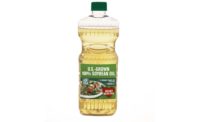FDA authorizes qualified health claim for oils high in oleic acid
A new FDA qualified health claim states that oils high in oleic acid, such as high oleic soybean oil, may reduce the risk of coronary heart disease.

The Food and Drug Administration (FDA) authorized the use of two qualified health claims citing that oils high in oleic acid, such as high oleic soybean oil, may reduce the risk of coronary heart disease. Food companies with existing products which meet FDA requirements can consider adding the health claim to labels of foods made with the ingredient (with inclusion of the proper disclaimers), and brands seeking to source heart-healthy ingredients for emerging products can test high oleic soybean oil in formulations.
The authorized health claim applies to edible oils containing at least 70 percent of oleic acid, a monounsaturated fat that provides the stability required for oils to perform in a variety of food applications, per serving. High oleic soybean oil oleic acid levels exceed 70 percent and can go as high as 75 percent, and the oil is lower in saturated fat compared to some other high-stability oils commonly used in food production.
High oleic soybean oil, approved for global use as of December 2017, offers food companies increased functionality, such as extended fry life, increased stability and a neutral flavor profile, making it ideal for frying, sautéing, baked goods and snack foods. It is a domestic crop, supporting U.S. farmers.
“The new health claims may motivate consumer packaged good and private label brands to consider reformulating products, such as salad dressings or bottled vegetable oils, using high oleic soybean oil,” said Dan Corcoran, QUALISOY chairman. “This announcement serves as an opportunity for those companies, as well as high oleic soybean oil suppliers and distributors, to call the health claim out on packaging to help drive sales.”
The announcement of the qualified health claims for oils high in oleic acid follows the FDA’s August 2017 authorization of the use of a qualified health claim confirming conventional soybean oil’s ability to reduce the risk of coronary heart disease. Conventional and high oleic soybean oils have different fatty acid profiles.
“As farmers, we take joy in providing Americans with an ingredient that has the potential to improve nutrition and prevent chronic disease, so the news of the qualified health claims is a source of pride for all U.S. soybean farmers,” said Lewis Bainbridge, United Soybean Board chair. “High oleic soybean oil is a sustainably produced crop, and consumers and the food industry alike can be confident that they are serving a quality ingredient to their families and customers.”
The newly authorized qualified health claims include:
“Supportive but not conclusive scientific evidence suggests that daily consumption of about 1½ tablespoons (20 grams) of oils containing high levels of oleic acid, when replaced for fats and oils higher in saturated fat, may reduce the risk of coronary heart disease. To achieve this possible benefit, oleic acid-containing oils should not increase the total number of calories you eat in a day. One serving of [x] oil provides [x] grams of oleic acid (which is [x] grams of monounsaturated fatty acid).”
“Supportive but not conclusive scientific evidence suggests that daily consumption of about 1½ tablespoons (20 grams) of oils containing high levels of oleic acid, may reduce the risk of coronary heart disease. To achieve this possible benefit, oleic acid-containing oils should replace fats and oils higher in saturated fat and not increase the total number of calories you eat in a day. One serving of [x] oil provides [x] grams of oleic acid (which is [x] grams of monounsaturated fatty acid.”
Looking for a reprint of this article?
From high-res PDFs to custom plaques, order your copy today!



.png?height=200&t=1676496309&width=200)



